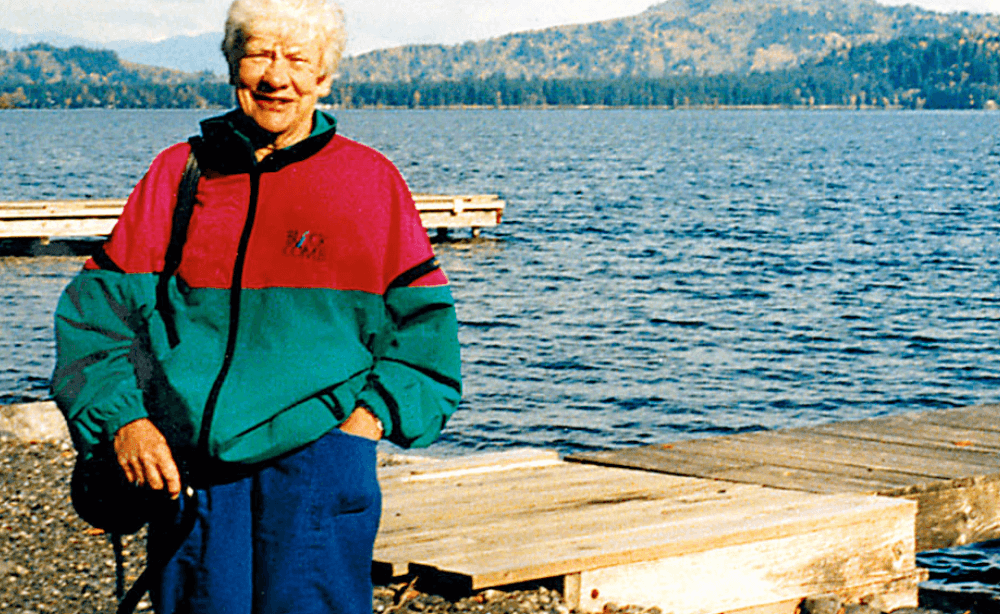“The human condition is not to pull a pharmaceutical sock over someone’s neurons; it is to reconnect us to our world. If agitation is interrupted and drugs are not dispensed, you can say MindfulGarden has done its job.”
Dr. Jeffery Wajda, CMIO, UC Davis Health, Advisory


“My journey as the founder of MindfulGarden through this often challenging world of delirium/dementia is both personal and professional. In 2000, my mother — retired educator (and gardener) Esther Winckler — died after 14 days at Chilliwack Hospital in British Columbia in what became a very high profile Canadian case covered extensively in the Vancouver Sun, on CBC Radio, as a chapter in the book After the Error, and in a website the family created called Esther’s Voice.
Undiagnosed delirium and overuse of restraints and psychotropic drugs are just a few of the over 30 issues the Coroner attributed as factors in Esther’s death, ruled as ‘Death by Accident’ in 2003. If there can be anything good from the tragedy, it is this: I had been running a digital company (Switch United) working with film, TV, and videogame clients for years. From this point on, I became interested in interactive digital technologies and their application to health care, and in particular to seniors.
At the invitation of a group of geriatric nurses, I became an advisor on continuity of care issues from the family’s perspective. In doing so, I became friends with, and admirers of a dedicated geriatric health care community in British Columbia. Working with them and telling Esther’s story at conferences or to graduating nurses and other caregivers was always a passion project for me… but not yet a vocation. In 2010, our agency was commissioned by the Vancouver 2010 Olympics to use our interactive experience to build a large 110 ft. long sensory wall called The Digital Gateway and a bigger-than-life four-sided touchscreen cube called The Curious Tree. We honed our craft here, and as I shared these experiences with my health care community the lights went on for us all: Could these interactive technologies have any application to the work they were doing, and could it find a place in the rapidly emerging area of ‘digital health?’
MindfulGarden began as an exploration on how to use digital technology to ‘interrupt’ hyperactive delirium behaviours in the highly vulnerable population of frail elderly patients in-hospital. These are patients who, like my mother, could go downhill quickly post surgery or on admittance to hospital with urgent underlying conditions. Without any other tools in the arsenal of the caregiver to address their highly agitated states of confusion, anxiety, and often aggression, restraints and psychotropic drugs are too often the tools of first choice. There had to be a better way.
Our team had tracked the effect that our digital environments had at the Olympics — hallways of soft light and moving images that flowed as the user moved down the hallway. A magical ‘cube’ that changed images as users interacted with the surfaces. We knew the calming effect these environments had had.
Our hypothesis became: Could the same digital technologies used in these entertainment environments be redeployed to distract, engage, and de-escalate adverse behaviours of patients in acute care who are all too often over-prescribed antipsychotic drugs and physical restraints? Could a new non-pharmacological approach to care be developed that would complement existing care protocols, but help achieve better health outcomes including shorter lengths of stay and fewer cognitive complications post-discharge?
MindfulGarden research
A first proof-of-concept at a small regional hospital with a high population of seniors admitted from local care facilities provided the first signal that we were ‘on to something.’ Our first patient, Dora, admitted for a suspected UTI and so agitated that an IV drip could not be administered, was introduced to MindfulGarden. As arms flailed and Dora shouted out, MindfulGarden responded with soothing visualizations matching her level of agitation and then levelling down as she calmed, eventually falling asleep. Dora was discharged the next day – 4 days earlier than forecast.
Two further clinical studies by noted gerontechnologist Dr. Gloria Gutman were conducted in long-term care settings with dementia patients in 2019/2020, published in the Journal of Alzheimer’s Disease Reports and presented at the world Gerontechnology Conference in Hong Kong that year. Despite the fact that dementia is not reversible — as delirium alone can be — these patients still responded with statistically significant results, particularly in morning care and bathing care.
Given the rising incidence rates and human and economic costs of delirium attributable to the global pandemic, MindfulGarden received Covid research exemption in 2020 for a randomized clinical trial in the ICU of Royal Columbian Hospital within the large Fraser Health Authority in British Columbia. The work of Principal Investigator Dr. Steve Reynolds and his team were published in the prestigious NATURE npj Digital Medicine in 2023 with key findings showing a significant decrease of agitation and a 25.7% reduction in PRN or ‘as needed’ anti-psychotic medications.
Cleared by Health Canada as a Class I medical device, MindfulGarden V.1 is currently in evaluations in hospitals in Canada and Hong Kong. The FDA pre-submission is complete and FDA clearance is targeted for 2026/27.
R&D on V.2 continues concurrently as MindfulGarden creates a full affective biofeedback platform — a framework in which biometrics are harnessed to positively affect the biostate of the user. Ultimately fulfilling MindfulGarden’s mandate: Sending patients home, brain healthy™
